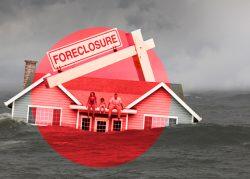Home buyers in 2022 are up against man-made and natural risks alike, and their changing search processes could sink home values in some areas.
Buyers with access to flood-risk information were more likely to make offers on homes with lesser risk than those without such access, according to a Redfin study. The three-month trial, conducted between October 2020 and January 2021, involved more than 17 million users, half of which had access to property flood-risk scores from First Street Foundation.
Users who looked at homes with severe or extreme risk ultimately bid on homes with moderate risk: the average risk score from viewing to bidding dropped 54 percent. Meanwhile, the control group — lacking the flood-risk data — bid on homes with an average severe risk score of 8.5 when viewing homes with the same hidden risk score.
A severe or extreme risk score was most likely to move the needle for buyers with access to the information, with no significant change in bidding patterns for homes with lesser risk scores.
If buyers equipped with flood-risk data are less likely to bid on homes in significant danger, the effect could be profound in the riskiest markets.
“As more house hunters become aware of climate risk, homes in endangered areas will likely receive fewer offers, causing home values to fall,” said Redfin chief economist Daryl Fairweather.
Those who live in formerly redlined areas may be at the biggest disadvantage, as those communities have a larger share of homes with high flood risk, according to a previous Redfin analysis.
Read more



Prospective buyers were also likely to change their search habits. Those with access to the risk data who viewed homes with an average 9.5 score before the study dropped to viewing homes with an average 8.5 score after starting the study. The control group didn’t see any meaningful change in average risk score of homes viewed by users.
Users in the experimental group only clicked through the flood risk section of a listing 2.8 percent of the time, but the report notes that may be because the score preview was deemed sufficient enough not to warrant a more in-depth analysis. The trial group’s users in Cape Coral topped the market rankings for clickthrough, followed by Houston and New Orleans.
Redfin last year began adding risk information to its listings, partnering with ClimateCheck data to provide rankings for fire, heat, drought and storm risks.
New Jersey nonprofit Climate Central recently estimated roughly $34 billion of real estate was at risk to be fully or partially flooded due to rising sea levels across the country in the next 30 years.
